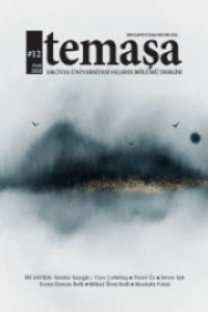Nietzsche’nin Metafiziğinde Fark Olarak Ebedi Tekrar
Bu makale, Nietzsche metafiziğinin özü olan “ebedi tekrar” doktrinin, fark perspektifinden bir analizini gerçekleştirir. Felsefede bu konu hakkındaki genel argüman şudur: Nietzschemetafiziğinde “ebedi tekrar” “aynının” tekrarıdır; fakat, bu makalede “ebedi tekrarın” “aynının”değil, “farkın tekrarı” olduğu savunulur. Bu perspektif ve argümandan hareketle makaledeilkin “ebedi tekrarın” özü, “oluş”, “şans” ve “zar atımı” üzerinden açıklanacaktır; çünkü buterimlerin tamamı hem “ebedi tekrar” hem de “fark” ile ilgilidir. İkinci olarak, makalede ontolojive yaşam perspektifinden “farkın ebedi tekrarına” bağlı olarak “güç istenci” idesi açıklanacaktır.Nietzsche’nin ontolojisinde “güç istencinin” iki türü bulunur: “reaktif güç istenci” ve“aktif güç istenci.” “Reaktif güç istenci” yeni ideler ve değerler yaratmayı, “ebedi tekrarı” ve“farkı” olumlamıyorken; buna karşın, “aktif güç istenci” yeni değerler, ideler ve perspektifleryaratma olarak “ebedi tekrarı” ve “farkı” olumlar. Buna ilaveten, “ebedi tekrarda” her yeni ideve perspektif ise trajedi olarak yaşamı olumlamaktır. Bu nedenle, makalede son olarak, trajediolarak “farkın ebedi tekrarı” açıklanacaktır. Özet olarak, bu makale “fark” olarak “ebeditekrar” kavramını analiz edecektir.
Anahtar Kelimeler:
Ebedi tekrar, fark, güç istenci, aktif güç istenci, reaktif güç istenci ve trajedi
The Eternal Recurrence as Difference in Nietzsche’s Metaphysics
This article provides an analysis from the perspective of the difference for the doctrine ofthe eternal recurrence that is the essence of the Nietzsche’s metaphysics. The general argumentabout this subject in the philosophy is that the eternal recurrence in the metaphysicsof Nietzsche is the recurrence of the same; but, in this article it is argued that the eternalrecurrence is the recurrence of the difference, not of the same. It is argued that the essenceof eternal recurrence is like depending on the chance, becoming, and the dice throw becauseall of these terms are both related to the eternal recurrence and the difference; basedon the perspective of ontology and the life, the will to power as depending on the eternalrecurrence of the difference is explained. On the other hand, there are two different kinds ofwill to power in Nietzsche’s ontology: the reactive will to power and the active will to power.As the reactive will to power does not approve eternal recurrence and creation of new ideasand values, the active will to power affirms the eternal recurrence of creating the new values,ideas and perspectives. In addition, every new idea and the perspective is to affirm theeternal recurrence as tragedy, therefore, the tragedy is explained as the eternal recurrence ofdifference. To sum up, this article analyses the eternal recurrence as the difference.
Keywords:
Eternal recurrence, difference, the will to power, the active will to power and the reactive will to power and the tragedy,
___
- Deleuze, Gilles. Nietzsche and Philosophy, trans. Hugh Tomlinson. London: Continuum, 1993.
- Hatab, Lawrance J. Nietzsche’s Life Sentence. New York: Routledge, 2005. Heidegger, Martin. Nietzsche-Volume I, trans. David Farrell. New York: Harper and Row, 1991.
- Heidegger, Martin. Nietzsche-Volume II, trans. David Farrell. New York: Harper and Row, 1984.
- Heidegger, Martin. Nietzsche-volume III, trans. Joan Stambaugh, David Farrell Krell, Frank A. Capuzzi. New York: Harper and Row, 1987.
- Heidegger, Martin, Nietzsche- Volume IV, trans. Frank A. Capuzzi. New York: Harper and Row, 1987.
- Kain, Philip J. “Skepticism, and Eternal Recurrence”. Canadian Journal of Philosophy 13, 3(1983), 365-387.
- Kaufmann, Walter. Nietzsche- Philosopher, Psychologist, Antichrist. Princeton: Princeton University Press, Fourth Edition, 1974.
- Loeb, Paul S. “Identity and Eternal Recurrence”. In A Companion to Nietzsche, ed. Keith Ansell Pearson, 171-189. Oxford: Blackwell Publishing, 2006.
- Lingis, Alphonso. “Differance in the Eternal Recurrence of the Same”. Research in Phenomenology, 8(1978), 77-91.
- Löwith, Karl. Nietzsche’s Philosophy of the Eternal Recurrence of the Same, trans. J. Harvey Lomax. London: University of California Press, 1997.
- Nietzsche, Friedrich. The Birth of Tragedy and Other Writings, trans. Ronald Speirs. Cambridge: Cambridge University Press, 1999.
- Nietzsche, Friedrich. The Will to Power, trans. Walter Kaufmann and R. J. Hollingdale. New York: Vintage Books, 1968.
- Nietzsche Friedrich, Friedrich, Early Greek Philosophy and Other Essays-The Complete Works of Friedrich Nietzsche Volume Two, translated by Maximilian A. Mügge, New York:The Macmillan Company.
- Nietzsche, Friedrich. The Anti-Christ, Ecce Homo, Twilight of the Idols and Other Writings, trans. Judith Norman. Cambridge: Cambridge University Press, 2007.
- Nietzsche, Friedrich. Beyond Good and Evil, trans. Walter Kaufmann. New York: Vintage Books, 1996.
- Nietzsche, Friedrich. Thus Spoke Zarathustra, trans. Adrian Del Caro. Cambridge: Cambridge University Press, 2006.
- Nehamas, Alexander. “The Eternal Recurrence”. The Philosophical Review 89, 3(1980), 331- 356.
- Pfeffer, Rose. “Eternal recurrence in Nietzsche’s Philosophy”. The Review of Metaphysics 19, 2(1965), 276-300.
- Pearson, Keith Ansell. “The Eternal Return of the Overhuman: The Weightiest Knowledge and the Abyss of Light”. Journal of Nietzsche Studies, 30(2005), 1-21.
- Zupancic, Alenka. Nietzsche’s Philosophy of the Two. London: The MIT Press, 2003.
- ISSN: 2148-371X
- Yayın Aralığı: 2
- Başlangıç: 2014
- Yayıncı: Prof. Dr. Arslan Topakkaya / Erciyes Üniversitesi Felsefe Bölümü
